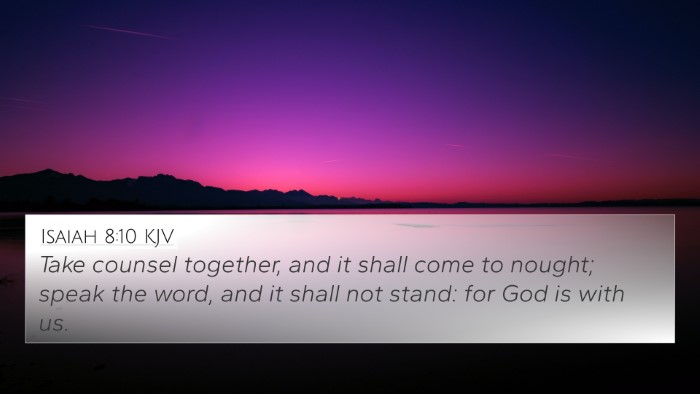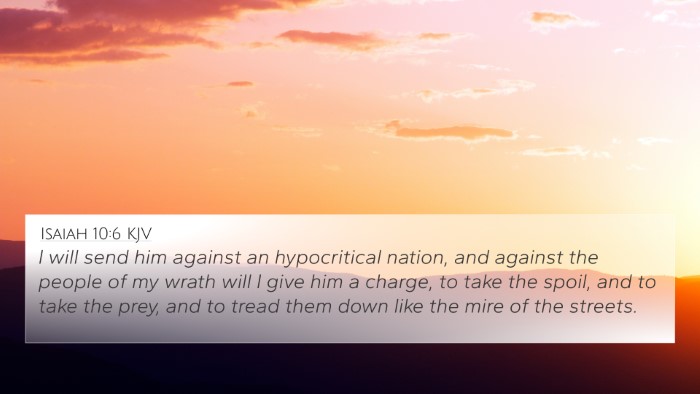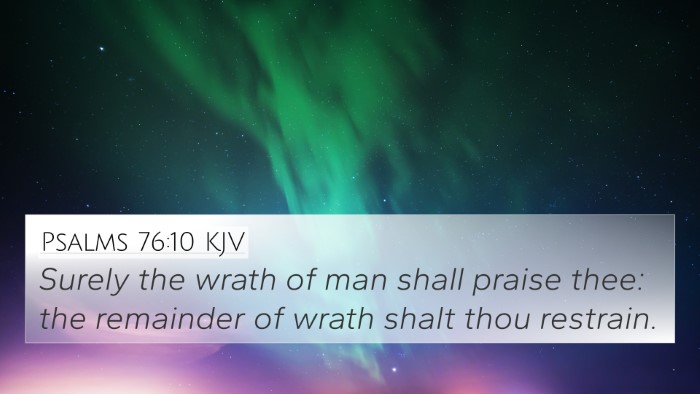Understanding Isaiah 7:7
Isaiah 7:7 reads: "Thus saith the Lord God, It shall not stand, neither shall it come to pass." This declaration carries significant weight in the context of biblical prophecy and God's sovereignty over nations and events.
Contextual Overview
This verse is part of a dialogue where God reassures King Ahaz of Judah amidst threats from neighboring nations. The Assyrian king had powerful intentions, and the fear gripping Ahaz represents the broader human tendency to react to earthly dangers with apprehension.
Interpretative Insights
- Matthew Henry: Commenting on this verse, Henry emphasizes the futility of human plans when they contradict God's will. Ahaz's fears are misplaced as the Lord Himself promises their failure.
- Albert Barnes: Barnes elaborates on God's assurance to Ahaz, indicating that when God declares something will not happen, it is a reflection of divine power to thwart any opposition. He stresses that faith in God provides peace in turmoil.
- Adam Clarke: Clarke points out that this statement from God serves as a divine oracle, illustrating His control over history. Ahaz’s apprehension is met with God's sovereign decree, reminding believers of the importance of trusting in divine providence.
Thematic Connections
The assurance given in Isaiah 7:7 can be linked to several key biblical themes:
- The Sovereignty of God: This theme runs deeply through both the Old and New Testaments, highlighting God's authority over nations and individual destinies.
- Faith Over Fear: The contrast between trusting God versus succumbing to fear resonates throughout Scripture; believers are encouraged to rely on God’s promises rather than worldly uncertainties.
- Prophetic Fulfillment: The statement implies that God’s will prevails, and it showcases how prophecies unfold in accordance with His divine timeline.
Related Bible References
For deeper study, Isaiah 7:7 can be cross-referenced with the following verses that share thematic and narrative similarities:
- Isaiah 8:10: "Take counsel together, and it shall come to nought; speak the word, and it shall not stand: for God is with us." This verse reinforces God's control over schemes against His people.
- Jeremiah 1:12: "Then said the Lord unto me, Thou hast well seen: for I will hasten my word to perform it." This echoes the theme of God's commitment to fulfilling His promises.
- Psalm 33:10-11: "The Lord bringeth the counsel of the heathen to nought: he maketh the devices of the people of none effect. The counsel of the Lord standeth for ever." Here, God's plans are contrasted with the futile ambitions of nations.
- Proverbs 19:21: "There are many devices in a man's heart; nevertheless the counsel of the Lord, that shall stand." This emphasizes the wisdom in surrendering to God’s will.
- Romans 8:31: "What shall we then say to these things? If God be for us, who can be against us?" An affirmation of God’s protective sovereignty akin to His message to Ahaz.
- Isaiah 46:10: "Declaring the end from the beginning, and from ancient times the things that are not yet done." This verse reinforces the foundational belief in God's omniscience.
- Daniel 2:21: "And he changeth the times and the seasons: he removeth kings, and setteth up kings." This highlights God's power to alter leadership and circumstances.
Practical Application
The message of Isaiah 7:7 serves as a reminder for believers facing personal or communal crises. It challenges individuals to cultivate faith in God's word over their immediate fears and encourages reliance on His omnipotent nature.
Using Bible Cross-References
Understanding and using Bible cross-references can enhance your biblical study. They help to:
- Identify connections between Bible verses, enriching one’s understanding of themes.
- Build a comprehensive Bible cross-reference system that aids in deeper study.
- Utilize tools like a Bible concordance for easy navigation of related topics.
- Draw comparative analyses between verses for thematic explorations.
Conclusion
Isaiah 7:7 is not just a historical statement but a vital reminder of God's unshakeable authority and the assurance that His will prevails against all human opposition. By examining cross-references and deeper meanings, believers can find strength and solace in God's sovereign plans.













